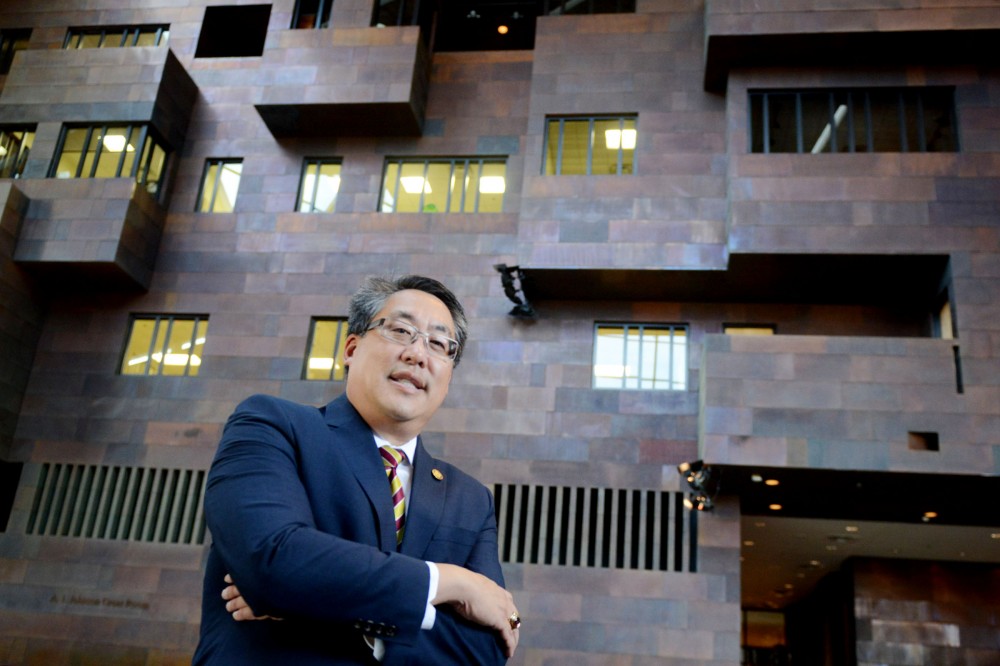 More than 20 years after Michael Hsu toured the University of Minnesota’s Board of Regents chamber as an honors student, he was elected as a member of the school’s governing Board.
More than 20 years after Michael Hsu toured the University of Minnesota’s Board of Regents chamber as an honors student, he was elected as a member of the school’s governing Board.
Since taking his board position, Hsu has become known as an outspoken regent, willing to ask tough questions of the University’s administration. He credits his time at the school as well as his private industry experience in helping him find a place on the board.
Hsu came to the school from Ames, Iowa as a national merit scholar, deciding on the University because of its highly-rated electrical engineering program.
While at the University, Hsu was involved in the Sigma Chi fraternity and a research aid at Honeywell’s System and Research Center.
“I think that [fraternity] experience helped me a lot in addition to the academic experience I got through the electrical engineering department,” Hsu said.
After graduation, Hsu got a job with Arthur Anderson Consulting after he graduated, after turning down an offer from the National Security Agency. “That was really hardcore technology.”
As a management consultant, Hsu played a large role in improving the efficiency of different companies’ technology, much like the work he does at the university today.
He is currently the president and co-founder of the TeeMaster Corporation, an online service that offers internet golf reservations, among other services.
As a regent, Hsu said he uses his experience in business and economics to help advocate for the financial future of the University.
Many of his comments and questions at board meetings reveal a data-driven mindset about University programs.
Other regents praised Hsu’s thorough research on board topics, saying his business background brings a valued analytical perspective to regents’ work.
“He is very bright and very thorough,” said Regent Thomas Anderson, who was elected with Hsu. “His strongest point on the board is probably his very thorough research on subjects.”
Regent Thomas Devine said Hsu has been a transformational member of the board.
“The board’s been concentrating on a lot more detail than they did … prior to his arrival. He’s a thorough guy,” Devine said.
The Daily recently caught up with Hsu and asked him about his time on the board and some of his priorities.
What went well for the University and the board last year?
“We have good agreements on the priorities the board wants to tackle … Some of the things that went well were our discussions around enrollment strategy … Getting the Athletes Village project moving was good. We had some success in the searches for some key positions … We had some good discussions on sexual assault. We’re now back to a 90,000 square foot Bell Museum.
What were some things that didn’t go so well last year?
I have never supported a budget so far. I think the budget process is bad. It comes to us and there’s really no time to make changes.
I’m very disappointed that we haven’t frozen tuition for in-state students. The amount of money that it takes to freeze tuition for in-state students is very minimal. The out-of-state students aren’t paying their share. We’re at the bottom of the Big 10 for out-of-state tuition … in-state students are subsidizing …It’s not fair for resident students to pay any kind of increase, you should give them a decrease. We could have very easily in the past two years frozen tuition on our own and we could have even lowered it.
The thing I was most disappointed in is we have colleges that aren’t full … with 50,000 applications for 5,800 spots, the fact is we have more spots than 5,800. We’re not admitting enough transfer students and we’re not admitting enough new high school students.
I was also unhappy with the way the definition of sexual assault and affirmative consent was created. They were trying to create it as an administrative definition and changing the administrative process. I was not happy that the General Counsel had not given an opinion on how this would affect the University and the treatment of students.
What are some of your goals for this year?
I’m excited about the four priorities that we have and working on changes to the budget process for the next budget.
I believe that the University will get stronger if we provide [students] with the best experience that we can … I think that if we can reduce the amount of negative stories about the University in the next year by being more proactive in dealing with the problems before they become so big that they become controversial, that’s another priority that I have.
What are some of the challenges you’re anticipating for this year?
That’s hard to predict, all of these things are difficult. The Pioneer Hall thing is difficult. In the budget, I wanted to make sure we had enough money included for mental health counseling and support for students, so I’m looking forward to seeing what the new money gets used for and whether or not it’s enough to deal with the mental issues that students are facing these days.
M Health is a big one, I think that’s another thing that didn’t go well, but I’m still optimistic. I still think it’s a necessary thing that we need to get moving on to improve the rankings of our medical school so that we can provide better healthcare for Minnesotans in the future.
Editor’s note: The Q&A section was edited for length and clarity.


